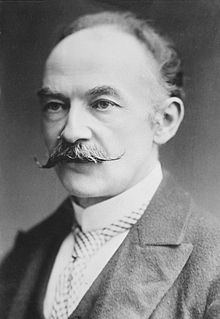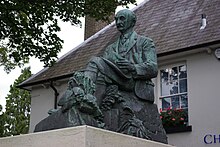Thomas Hardy
Thomas Hardy (born June 2, 1840 in Higher Bockhampton near Dorchester , Dorset , † January 11, 1928 in Dorchester, Dorset) was a British writer .
Life
The son of a builder went to London after an architectural apprenticeship. In 1867 he returned to Dorset and began writing alongside his work as a church restorer. His first novel was titled The Poor Man and the Lady and was never published; Only the fragment An Indescretion in the Life of an Heiress is preserved , the rest of the manuscript is said to have been destroyed. Hardy himself later called the lost first novel his favorite.
In 1871 the first of his famous "Thomas Hardy's Wessex" novels appeared, which are set in the fictional region of Wessex, which is modeled after his home environment. The name "Wessex" is derived from the medieval kingdom of the same name . From 1878 to 1881 he lived again in London, from 1883 back in Dorchester.
Hardy left an extensive body of work, including 14 novels, many short stories of very different sizes and almost 1,000 poems. The novelist Hardy was more interested in people as such than in individual characters; nevertheless, at the center of his works is often the struggle of individuals against malevolent forces, some of which are fateful, some are man-made. His two late novels Tess of the d'Urbervilles and Jude the Obscure , which openly questioned the religiosity and sexual morality of the time and met with rejection from publishers and many readers, are particularly radical in this regard . Hardy treated his characters partly as a vehicle to represent his own view of life.
The publication of Jude the Obscure caused another scandal, which is why Hardy decided to stop publishing novels from now on. After 1895 he only wrote poetry. In 1916 he was elected to the American Academy of Arts and Sciences .
Hardy was married twice. His first wife Emma Lavinia Gifford , whom he married on February 17, 1874, died on November 27, 1912. After a year and a half of widowhood , he married his secretary Florence Emily Dugdale, 39 years his junior, on February 10, 1914 . He stayed with his second wife until his death. His heart was buried in the churchyard at Stinsford , Dorset ; the rest of the body cremated and buried in Westminster Abbey .
In 1928 and 1930, Hardy's widow Florence published the biography The Life of Thomas Hardy . Hardy's life and thinking are told in great detail and in a flattering light in the third person. As it turned out later, however, Hardy himself was the secret author of this biography. His wife just typed the manuscripts, which he then burned. At the beginning of the disguised autobiography it is explicitly stated that Hardy himself, despite many inquiries, did not consider it necessary to write down his own life because he did not have enough admiration for himself.
Hardy's birthplace "Hardy's Cottage" in Higher Bockhampton, where he lived until he was 35, and the later home "Max Gate" in Dorchester are owned by the National Trust .
The spectrum of Hardy's works ranges from the realistic and detailed portrayal of country life to the representation of the unexpected, the unusual, the suspicious, from the tragic to the humorous. He tries to avoid sentimentality. He often uses the oral narrative tone, for example in A Tradition of Eighteen Hundred and Four (in Wessex Tales ).
Works
Novels
- 1867: The Poor Man and the Lady - only survived in fragments
- 1871: Desperate Remedies - published anonymously
- 1872: Under the Greenwood Tree ( The Love of Fancy Day ) - published anonymously
- 1873: A Pair of Blue Eyes ( Blue Eyes )
- 1874: Far from the Madding Crowd ( On the green edge of the world )
- 1876: The Hand of Ethelberta
- 1878: The Return of the Native ( The Homecoming / The Return / Clyms Homecoming / On Winding Paths )
- 1880: The Trumpet-Major ( John Loveday, the stick trumpeter )
- 1881: A Laodicean
- 1882: Two on a Tower
- 1886: The Mayor of Casterbridge ( The Mayor of Casterbridge: The Life and Death of a Man of Character )
- 1887: The Woodlanders ( The Woodlanders )
- 1891: Tess of the d'Urbervilles ( Tess of the d'Urbervilles : A pure woman )
- 1892: The Well-Beloved - published as a series, then in book form in 1897
- 1894: The Specter of the Real - also together with Florence Henniker
- 1895: Jude the Obscure . Goldmann, München o. J., 1988. (Series Classics.) ISBN 3-442-07807-5
- in German: Juda, the infamous . Translated from A. Berger. German publishing company, Stuttgart 1901.
- in German: hearts in turmoil . Translated from Eva Schumann . Aufbau-Verl., Berlin 1956.
- in German: In the dark . Translated from Eva Schumann. Greno, Nördlingen 1988, ISBN 3-89190-440-1 .
- in German: Jude Fawley, the unknown . Translated and edited by Alexander Pechmann . Hanser, Munich 2018, ISBN 978-3-446-25828-0 .
Collections of short stories
- 1889: Wessex Tales ( The Three Strangers )
- 1891: A Group of Noble Dames ( A wreath of noble women )
- 1894: Life's Little Ironies
- 1913: A Changed Man and Other Tales
Collection of poems
- 1898: Wessex Poems
Film adaptations (selection)
- 1967: Die Herrin von Thornhill ( Far from the Madding Crowd ) - Director: John Schlesinger
- 1979: Tess - based on the novel Tess of the d'Urbervilles - directed by Roman Polański
- 1981: The Secret of the Devil's Pocket ( Tajemstvi diablovy kapsy ) - Director: Petr Tucek
- 1994: The Return of the Native - Directed by Jack Gold
- 1996: Herzen in Aufruhr ( Jude ) - Director: Michael Winterbottom - based on the novel Jude the Obscure
- 1997: The Woodlanders, based on Thomas Hardy, screenplay by David Rudkin
- 1998: Far from the Madding Crowd - Directed by Nicholas Renton (four-part British television series)
- 2000: The Empire and Glory ( The Claim ) - based on the novel The Mayor of Casterbridge - Director: Michael Winterbottom
- 2005: The Love of Fancy Day - based on the novel Under the Greenwood Tree - Director: Nick Laughland (film adaptation of the BBC)
- 2008: Tess of the D'Urbervilles - Director: David Blair (film adaptation of the BBC)
- 2015: On the green edge of the world - based on the novel Far from the Madding Crowd - director: Thomas Vinterberg
literature
- Stephan Kohl: Thomas Hardy: “Jude the Obscure”. In: Martha Kleinhans, Klaus Stierstorfer (Hrsg.): Readings for the 21st century. Key texts in European literature: England, France, Ireland, Italy, Portugal, Russia. Königshausen & Neumann, Würzburg 2001, ISBN 3-8260-1944-X , pp. 79–91.
- Stephan Kohl: The limits of the visible: Thomas Hardy's realism. In: Uwe Dethloff (Ed.): European Realisms: Facets - Convergences - Differences. International Symposium on Romance Studies at Saarland University 21. – 23. October 1999. Röhrig, St. Ingbert 2001, pp. 169-183. (Series: Annales Universitatis Saraviensis, 18)
- Eckart Voigts-Virchow: Thomas Hardy: For Conscience 'Sake . In: Raimund Borgmeier (Ed.): Interpretations. English short stories from Thomas Hardy to Graham Swift (= Universal Library. No. 17509). Reclam, Stuttgart 1999, ISBN 3-15-017509-7 , pp. 21-29.
Web links
- Literature by and about Thomas Hardy in the catalog of the German National Library
- Works by and about Thomas Hardy in the German Digital Library
- Newspaper article about Thomas Hardy in the press kit of the 20th century of the ZBW - Leibniz Information Center for Economics .
- useful link with works and characterizations
- Collected works by Thomas Hardy (English)
- National Trust: "Hardy's Cottage" with a link to "Max Gate"
- Far from the Madding Crowd and other works by Thomas Hardy (English).
supporting documents
- ^ Peter Widdowson: Thomas Hardy : Northcote House, Plymouth (1966), p. 26
- ^ Map of Thomas Hardy's Wessex. In: British Library. Retrieved January 18, 2019 .
- ^ Edward Albert: History of English Literature, Oxford University Press (1979/2000), pp. 436f.
- ^ Peter Widdowson: Thomas Hardy : Northcote House, Plymouth (1966), p. 6
- ↑ Michael Millgate: Thomas Hardy: the biographical sources , in: Dale Kramer (Ed.): The Cambridge Companion to Thomas Hardy , Cambridge University Press: Cambridge (1999), p. 2
| personal data | |
|---|---|
| SURNAME | Hardy, Thomas |
| BRIEF DESCRIPTION | British writer |
| DATE OF BIRTH | June 2, 1840 |
| PLACE OF BIRTH | Higher Bockhampton at Dorchester , Dorset |
| DATE OF DEATH | January 11, 1928 |
| Place of death | Dorchester , Dorset |



